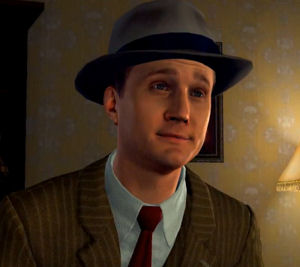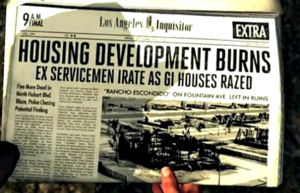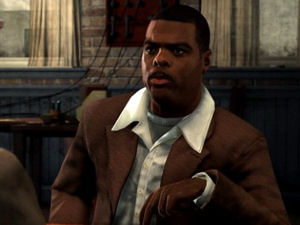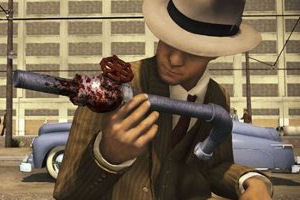Solo Gamer Review: L.A. Noire
Rockstar Games is known for putting out blockbuster titles with extremely high production values. With its latest release, L.A. Noire, Rockstar has promised a completely new type of video game experience, one that uses radical new technology to put gamers deeper into its fictional universe than ever before. While many developers make promises like this that ultimately turn out to be wild exaggerations, Rockstar usually manages to deliver. But can L.A. Noire really be as groundbreaking and innovative as its creators advertize, or should expectations be lowered?
STORY
 | | Niko Bellic this guy ain't |
L.A. Noire, as the title suggests, takes place in the City of Angels in 1947, during the reign of studio system Hollywood, the mobster Mickey Cohen, and hard-boiled fictional detectives made famous by pulp novelists like Dashiell Hammett. You are put in the shoes of Cole Phelps, a rising star in the LAPD who by all outward appearances is as clean-cut as they come. He is a war hero, moralist, and sleuth, all the ingredients necessary to be the kind of man L.A. needs. For this reason, Phelps is a breath of fresh air as a video game hero, as most great game heroes these days--Mario and Link notwithstanding--are morally grey or downright bad. Phelps lectures his partners about their vices, doesn't tolerate corruption, and always looks pained when he is forced to gun down a villain. Still, the story borrows heavily from film noir, so even though Phelps may be as shiny as a silver dollar, every other character in the game is fairly dark or deeply compromised.
Throughout the entire game--from the very beginning to the very end--there are flashbacks to Cole's time in the war. These brief cutscenes are surprisingly relevant, but they don't seem so at first. For this reason, it's a shame they can't be rewatched without starting the entire game over again. Outside of that, there are also a series of cutscenes you can get from thirteen newspapers strewn throughout the main story. These cutscenes, like the flashbacks, don't seem relevant at first, but by the end, they are absolutely critical to understanding some of the plot's finer details.
The main story, which is broken up into roughly three sections, follows Phelps through a remarkably quick but eventful career as he goes from patrolling the streets to working homicide and more. The first part focuses on Phelps proving himself to be an excellent "case man." Little bits and pieces of his backstory are hinted at, but he keeps his cards pretty close to his chest. You know he's married and has children, but you don't see his family yet. You are also given information concerning characters and events that don't become central to the plot until much later in the game, though you're unlikely to pick up on all of it unless you play through a second time.
The second part of the game is even more streamlined and straight-forward than the first. Phelps is eventually promoted to homicide, where he immediately starts working murders that all bear an eerie similarity to the famous Black Dahlia case. Almost everything that happens during this section of the game directly relates to the homicide cases, and much of the larger story is left on the backburner. This is good, because there are a lot of names and cases to keep track of in Homicide, and the writers wisely decided not to muddy the waters at this point.
 | | Players would be wise to play very close attention to things that don't yet seem relevant |
The final sections of the game, which I promise not to spoil, are where the story takes a sharp turn to the noir. The larger plot is thrown into the forefront, with plenty of complexity and melodrama. Some players might not be ready for where the story goes, and those with short attention spans will quickly find themselves whiplashed and confused by the drastic twists and turns. However, players who are more familiar with everything that noir entails will be delighted. Though the first two parts bear some similarities to the novels of James Ellroy--L.A. Confidential and The Black Dahlia especially--the final act feels like you are completely immersed in Ellroy's complex L.A. mythology.
The biggest complaint that can be leveled against the story is that it is actually too focused on the main plotlines. While working the Traffic desk and the Patrol desk (which is really just the game's tutorial), the cases are individual and unique, giving players the impression that the game is episodic, that each case stands alone. While the interweaving cases later in the game are certainly welcome and the main plot is deep and satisfying, once Phelps leaves Traffic, every case becomes related. There are no stand alone cases from this point on (aside from DLC), and that's pretty disappointing.
A real opportunity for variety is lost here. For example, when Phelps is working the Homicide desk, it would be fun to explore various types of homicides like questionable suicides or random shootings, and players are bound to feel a little exhausted by the time they come across the third or fourth case in a row involving a murdered woman on display, a poor marriage, and multiple male suspects with plenty of motive. Patterns like this one continue later in the game as well. The ending leaves room for a sequel, though, so one hopes the inevitable second installment will correct for this and throw in more stand alone stories to go along with a fully realized and complex main plot.
|
[Story: 8.5 - Cole Phelps is a stellar protagonist, the plot is deep and full of surprises, and there is plenty of noir, but it will eventually go over the heads of many gamers and there should have been more variety with the individual cases]
|
|
GAMEPLAY
 | | Faces are extremely expressive |
Claims that the gameplay is unlike anything ever released before are certainly overblown, but the game is unquestionably the most advanced and refined game to tackle crime scene investigation. The basic formula is that you go to a crime scene, talk to the reporting officer and/or coroner, look around for clues, question witnesses, drive to points or persons of interest, interrogate suspects, and then take down the appropriate criminals, with some additional action like car chases and shootouts thrown in. This is not a new formula, as it has been the bread-and-butter of the CSI games for nearly a decade now and can be found in some early P.C. adventure games like Police Quest and Blade Runner. Nevertheless, it is not an exaggeration to say that L.A. Noire is a unique experience.
This is largely due to the much-touted facial capture technology. Actors were filmed twice, once to capture body motion as is getting more and more common these days, and once to capture their facial expressions and head movements in high-definition 3D with a mind-boggling array of cameras. These two performances were then merged seemlessly into the video game world, giving every character a whole new level of detail and personality. It's a little creepy at first, but once you come to terms with the uncanny valley, it's hard to imagine ever going back to the blocky, static, texture-mapped faces that permeate every other 3D game universe.
In a sense, the game designers wanted to turn you into Tim Roth's character from Lie to Me in that a large part of the gameplay depends on your ability to weed out the truth-tellers from the liars. You get more information, more clues, and a better score for calling out lies and staying calm with people who are being honest. For the most part, though, you don't need a whole lot of intuition to tell when one of the game characters is stretching the truth. The actors usually exaggerate their expressions and body language to make it easy. The hard part is deciding whether to call them on it, which requires you to have the appropriate evidence, or just doubting their story. Sometimes, it is impossible to know, because the dialogue is occasionally ambiguous and you wind up needing to decipher what the writers intended rather than what the character is actually telling you. You are free to use trial and error, but with no real control over the autosaves and no ability to skip most cutscenes, perfectionists will find this tedious at best.
 | | This probably isn't important |
The game does offer "intuition points" to help out, but for a variety of reasons, these are largely useless. For one thing, when you use them during an interrogation, they will eliminate one of three possible responses ("truth," "doubt," or "lie"), but it's always the most obviously wrong. You can also use a point to give you an idea of what other players think is the right response, but if the odds are in favor of "lie," there is nothing helping you decide what piece of evidence will prove it. You can also use an intuition point to help you find clues at a crime scene or place of interest, but due to the extremely helpful musical cues, you'll rarely ever be stumped. Finally, given that you earn intuition points by leveling up, it is odd that the game doesn't let you collect intuition points during the "free roam" sections of the game, where many gamers are bound to do some power leveling.
Despite the ease of finding clues in various locations, these parts of the game are successful in that you really feel like you are putting things together or unearthing secrets that help the case fall into place. It's also surprisingly satisfying picking up an item and rolling it around in your grip. It is, at the very least, far better than the mindless pointing and clicking found in other investigative games.
Another thing that separates L.A. Noire is the action. The car chases and shootouts are reminiscent of Grand Theft Auto. The driving is almost identical, but you are penalized in your final score for damaging your car or city property, as well as for hitting bystanders. Driving safely, it should be noted, is ludicrously hard to do, especially since other cars don't always seem to honor traffic lights, bystanders are unpredictable, and routes are not drawn on your map. You also have no control over the radio, which effectively forces you to listen to the only radio station in town. The music is great and period-specific, but it's not exactly varied. When you're working a case, you can usually get your partner to drive, which effectively fast-travels you, but sometimes you will be forced to drive, either to tail a suspect or take part in an adrenaline-fueled car chase.
-e. magill 6/8/2011
|
|